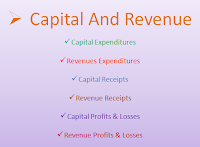Explain the Difference Between Capital and Revenue Items of Expenditure and Income
Before we explain the difference between capital and revenue items of expenditure
and income, we must know that transactions can be divided into two types
according to period of time.
Long Term Period
Long-term period means more than one year and short term period
means less than or equal to one year. Transactions having long term period of
time are Capital Transactions. Office Furniture, Machinery, Building purchased
are examples of Capital Transactions.
Short-term period
Transactions having short term period of time are Revenue
Transactions. Examples are Rent paid, Average Salary of an employee paid, fees received, stationary
purchased.etc.
As we know expenses in accounting are incurred for the purpose of generating revenues and revenues accounts are calculated by taking the differences between profit and expenses, so Expenses and Revenues (Income) are basically two types of accounts and both are two different types in nature. So Capital and Revenues Expenditures are differentiated with respect to expenses accounts and revenue accounts.
For Expenses
For Revenues
Capital Receipts (Inflows)
Revenues Receipts (Inflows)
Capital Expenditures
Expenditures having life more than one year. Examples are office
furniture, building, property and plant. These expenditures are called fixed
assets or non-current assets. These provide probable future benefits to the
business.
Revenue Expenditures
Expenditures having life less than or equal to one year are called
revenue expenditures. Examples are salaries paid, rent paid, wages paid, goods
purchased, etc. These can be categories as expenses. The benefit which the
business gets is of short period of time.
Capital Receipts
Receipts having life more than one year. Examples are disposal on
sale of non-current assets, loan from bank, capital invested in the business.
Theses receipts are the representation of Long-term Liabilities and Owner’s
Equity.
Revenue Receipts
When the receipts have life equal to one or less. Examples are fees
received, commission received, goods sold, etc. Revenues receipts fall under Income
Statement.
Capital profits
It is earned on the sales of capital expenditures. For example office
furniture purchased whose written down value is for Rs.90000 after 5 years sold
for Rs.110000. The remaining balance of Rs.20000 is a capital profit.
Revenue profit
The profits earned by the business in operating activities. For example,
fees received, rent received.
Capital Loses
Loses that suffered by the business on the capital expenditures.
For example, Office Furniture having book value of Rs.70000 sell to Rs.50000,
then the capital loss is Rs.20000.
Revenue Loss
This loss is suffered by the business during the operating activities
of the business. Examples are loss on sale of selling goods, Bad debts, etc.
You can read "What makes a small business successful" if you have desire to search for small businesses and are interested in the successful of Small Business.
You can read "What makes a small business successful" if you have desire to search for small businesses and are interested in the successful of Small Business.
So after Explaining the Difference Between Capital and Revenue
Items of Expenditure and Income, we can say that both types of transactions are the
basis of the Accounting Cycle and without understanding their accounting treatments, Financial Statements can not show us true and fair view of the Company Businesses.

Comments